- ABOUT US
- PROGRAM AREAS
- CONSERVATION APPROACH
- EDUCATION
- MULTIMEDIA
The Coral Program's 2022 Ernest F. Hollings Scholar: Madison Gard
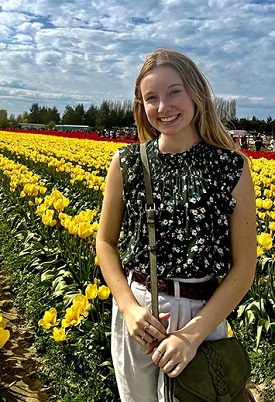
In June, the Coral Reef Conservation Program welcomed a new Ernest F. Hollings undergraduate intern, Madison Gard. Madison is a double-major at Western Washington University (Bellingham, WA) studying environmental science with a marine emphasis and Spanish. Her interest in fisheries and ecosystem-based management was sparked by her work in the Marine Mammal Ecology Lab at her university where she is a research assistant working on a variety of projects. Madison was excited to increase her knowledge of coral reef ecology, natural resource management, and restoration strategies through her Hollings experience. Madison was mentored by Tauna Rankin, NOAA's Coral Program Analyst & Marine Habitat Resource Specialist, who focuses on fisheries management and sustainability in U.S. coral reef jurisdictions. The Hollings Scholarship Program provides successful undergraduate applicants with awards that include academic assistance for two years of full-time study and a 10-week, full-time paid internship at a NOAA facility during the summer. The internship between the first and second years of the award provides the scholars with hands-on, practical experience in NOAA-related science, research, technology, policy, management, and education activities.
Throughout the summer, Madison focused on translating existing evidence on the synergistic relationships of coral reef conservation and sustainable fisheries into communications products for managers and the public. She compiled a library of the latest science regarding the linkages between fisheries and coral reef conservation for managers and researchers to cite in management plans, grant proposals and provide rationale for management decisions.
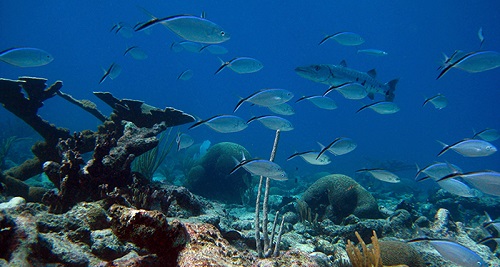
Madison also synthesized the information gathered from her interviews with coral experts and literature reviews to author two infographics for public science communication. The infographics showcase four of the key relationships between managed fishery populations and their coral reef habitats, using analogies to show how people care for their homes and are tailored to represent species from the Atlantic and Pacific basins in order to resonate more closely with locals from the regions. NOAA is sharing these infographics with local managers to use online and at public meetings to explain the importance of managing healthy reefs to sustain fisheries and vice versa.
Coral Housekeepers in the Atlantic Basin
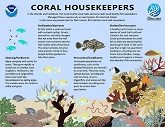
Coral Housekeepers in the Pacific Basin
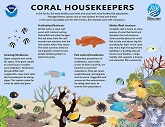
Related Stories and Products
About Us

The NOAA Coral Reef Conservation Program was established in 2000 by the Coral Reef Conservation Act. Headquartered in Silver Spring, Maryland, the program is part of NOAA's Office for Coastal Management.

The Coral Reef Information System (CoRIS) is the program's information portal that provides access to NOAA coral reef data and products.
Work With US
U.S. Coral Reef Task Force
Funding Opportunities
Employment
Fellowship Program
Contracting Assistance
Graphic Identifier
Featured Stories Archive
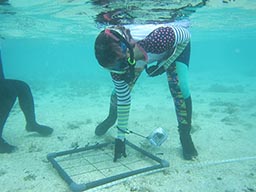
Access the archive of featured stories here...
Feedback
Thank you for visiting NOAA’s Coral Reef Conservation Program online. Please take our website satisfaction survey. We welcome your ideas, comments, and feedback. Questions? Email coralreef@noaa.gov.
Stay Connected
Contact Us
NOAA’s Coral Reef Conservation Program
SSMC4, 10th Floor
1305 East West Highway
Silver Spring, MD 20910
coralreef@noaa.gov
